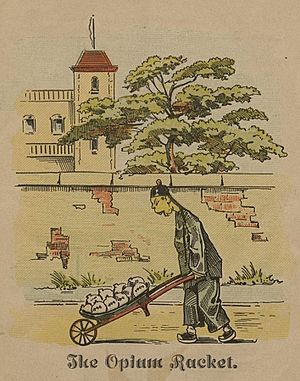Tong Kee facts for kids
Tong Kee, also known as T. Aki, was a Chinese businessman who lived in the Kingdom of Hawaii. He was involved in a major event in 1886–1887 called the Aki scandal. This scandal was about a promise made to Aki for a special business permit that was not kept. It involved King Kalākaua and a government official named Junius Kaʻae.
Contents
About Tong Kee, also known as Aki
Tong Kee became known as Aki in Hawaii. He owned a rice farm and a mill in Waiau, located in the ʻEwa District on the island of Oahu. In Hawaii, Chinese names were often changed. People would add "Ah" before a given name, so "Ah Kee" became "Aki." Because of this, Aki became his last name in Hawaii, even though his original Chinese family name was Tong.
The Scandal Begins
In December 1886, Junius Kaʻae worked for King Kalākaua. He was the Registrar of Conveyances, which meant he handled official documents. Kaʻae convinced Aki to offer money to the king. Aki wanted to get a special permit to import and sell certain goods in Hawaii.
Aki paid a large sum of money, about $71,000, to the king. This money was brought into ʻIolani Palace in several trips. Kaʻae and the king received the money.
The Permit and the Lawsuit
However, the special permit was given to someone else. It went to Chun Lung, who was the son of a wealthy Chinese businessman named Chun Afong. When Aki found out, he asked for his money back. The king refused to return the money.
Because the money was not returned, Aki decided to take legal action. He filed a lawsuit against the king. Aki and others involved in the case released many official statements, called affidavits. These statements explained the details of the scandal. The king's side later argued that the money Aki gave was a gift. They claimed the king accepted it unwillingly.
The Scandal in the News
The scandal was even made fun of in a political pamphlet called the Gynberg Ballads. Alatau T. Atkinson, who edited the Hawaiian Gazette newspaper, published it. Another person, Edward William Purvis, might have helped write it.
These pamphlets arrived from San Francisco in May 1887. They were shared widely, even though the government tried to stop them. One part of the pamphlet, called "The Opium Racket," described the scandal. It used different names for the people involved. Aki was called "You Lie," the king was "Gynberg Duke," and Kaʻae was "Kiyi." This publication and the scandal made people feel more negative towards the king and his government. It also led to more anti-Chinese feelings among some foreign residents.
Impact on the Kingdom
This scandal was one of the reasons for a major political change in July 1887. Opponents of the king forced him to sign a new document. This document was the 1887 Bayonet Constitution. It greatly limited the king's power.
After this, Kaʻae had to leave his job. The new constitution also took away the voting rights of Chinese residents who had become citizens. It created a voting system based on race, which meant people of Asian descent could not vote or become full citizens.
Aki passed away on October 7, 1887, before his lawsuit against the king was finished. The court eventually decided that money given as a bribe could not be returned in a civil lawsuit. The Supreme Court of Hawaii also ruled that the king had legal protection from such lawsuits.
Images for kids
 | William M. Jackson |
 | Juan E. Gilbert |
 | Neil deGrasse Tyson |



